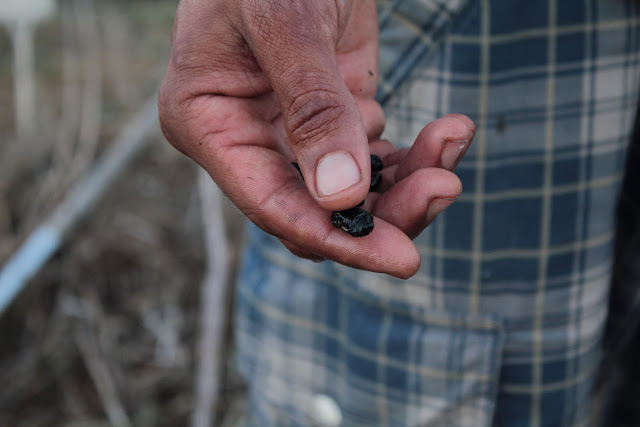sexta-feira dia 26 de Outubro, a partir das 20.30h no RDA 69
(Rua Regueirão dos Anjos, nº 69)
O Projecto270 inicia um ciclo de jantares/conversas sobre o conceito de Soberania Alimentar, no âmbito da globalização da luta na defesa do bem comum.
o jantar será servido a partir das 20.30h
a conversa terá início às 21.30h
O primeiro tema a ser abordado será a água, um bem comum essencial à vida do planeta, no qual o modelo industrial/financeiro foca as suas atenções com o objectivo de o privatizar, deste modo, contribuindo ainda mais para a exclusão social e a violência que lhe é inerente.
Num momento em que pessoas de todo o mundo ganham
consciência da importância na defesa do bem comum, tendo a percepção cada vez
mais nítida do jogo de casino para o qual são empurradas. Como ficar de fora e
promover a falência deste jogo?
Poderá o projecto de Soberania Alimentar contribuir como alternativa ao modelo
económico neo-liberal, contribuindo igualmente na luta contra as alterações
climáticas e a perda de biodiversidade global? Poderá alimentar uma população
mundial cada vez mais numerosa sem depredar os recursos naturais?
*
O tema da água é inseparável da Soberania Alimentar / The issue of water is inseparable from Food Sovereignty
European Coordination Via Campesina, position paper - March 2012
Food Sovereignty guarantees that the rights to use and manage land, water, seeds, livestock and biodiversity and should remain in the hands of those who produce the food. (Nyeleni declaration 2007).The Food Sovereignty movement is well aware of the fact that the struggle for water is part of the broader current context of privatisation of nature that is promoted by the policies introduced by the WTO, the IMF and the World Bank, the World Water Council and the CAP. As we have previously stated on the question of seeds and land, the struggle for water is an integral part of our strategy for introducing Food Sovereignty and preventing all forms of privatisation.
For ECVC, water is a resource that should be considered as a Commons, and managed by public authorities as a common good. We are against the privatisation and commodification of water. Access to water for all is a social and human right, (a right that is shared by all life) ; it is fundamental and indispensable to all life and to the identity of communities. Water is neither a good that can be privatised nor a tool for market speculation.
Rights “to” and “of” water in the perspective of Food Sovereignty
The water cycle is central to our preoccupations and reflections. Water rights involve the constant and integral respect of the water cycle. If we are unable to guarantee the respect of the water cycle, the availability of water will be undermined. The right “of” water is a prerequisite of the right “to” water. +...
~
|
Miguel Altieri: Why is agroecology the solution to hunger and food security?
Food movements, agroecology, and the future of food and
farming. Today, a billion people live in hunger. Peak oil and
environmental degradation threaten the food security of billions more,
particularly with half the world's population living in urban
environments where they are dependent on industrially produced and
imported food. A transition is urgently needed, but how? What
alternative policies can enable communities to realise their own food
security in the face of environmental challenges, while also improving
livelihoods, building resilience, and conserving ecosystems? Many
food-related movements have already emerged around the world, but what
ongoing challenges do they face?
~
The Commons
The idea of the commons
is experiencing a timely resurgence as access to resources has becomes
more limited and increasingly corporatised for the benefit of the few to
the detriment of the rest of society. The commons
historically refers to land that was used to grow food that was
controlled by the local community to provide for the local community’s
needs. The opposing force that destroys the commons
is the enclosure. Enclosures occur when common resources are usurped by
private interests thus destroying the essence of commonality. The
consequences are that the commons
become restricted to those with economic power. It was the Enclosures
Acts in the UK that took the common land away from the people, forcing
them into a wage-based economy that they no longer had direct control
over. It should be noted that many of the resources needed to sustain
life are now enclosed such as food, land, knowledge, culture, technology
and buildings have ironically been built on the labour of the many. The
commons
movement seeks to reclaim what is rightfully everyone’s. This is a
rapidly growing movement that exists in all aspects of culture: through
the creative commons software model, land reform campaigns, community gardens to community libraries. We believe that reclaiming the commons is key to producing a permanent culture that benefits all.
(via http://www.permanentculturenow.com/the-commons/)
~
~


















